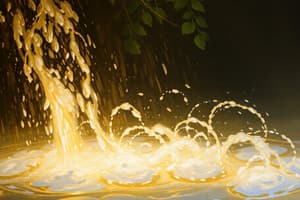Podcast
Questions and Answers
What occurs during evaporation that leads to a decrease in temperature of the remaining liquid?
What occurs during evaporation that leads to a decrease in temperature of the remaining liquid?
- Attractive forces between particles become stronger.
- The average kinetic energy of the particles increases.
- Particles with lower energy escape the liquid.
- Particles with the highest energy escape the liquid. (correct)
Which condition is NOT a factor that increases the rate of evaporation?
Which condition is NOT a factor that increases the rate of evaporation?
- High pressure (correct)
- Higher temperature
- Windy conditions
- Lower humidity
Which analogy best describes the process of evaporation cooling the remaining liquid?
Which analogy best describes the process of evaporation cooling the remaining liquid?
- A few students leave a class, resulting in a taller average height.
- Tall students leaving a class resulting in a shorter average height. (correct)
- Students adding height to a class until they reach an average of 2 m.
- A teacher instructing students to sit down, lowering the average height.
When sweat evaporates from the skin, which direction does heat transfer occur?
When sweat evaporates from the skin, which direction does heat transfer occur?
Which liquid likely evaporates the quickest due to having the lowest boiling point?
Which liquid likely evaporates the quickest due to having the lowest boiling point?
What can be concluded about the particles in a warmer liquid compared to those in a cooler liquid?
What can be concluded about the particles in a warmer liquid compared to those in a cooler liquid?
Why does evaporative cooling occur in relation to the particles in a liquid?
Why does evaporative cooling occur in relation to the particles in a liquid?
In which situation is evaporation expected to be the slowest?
In which situation is evaporation expected to be the slowest?
Flashcards are hidden until you start studying
Study Notes
### Evaporation
- Evaporation is the change of liquid to gas below its boiling point.
- Liquid particles move randomly, with different energies.
- Attractive forces bind liquid particles together, but particles with the highest energy can overcome these forces and become gas.
- During evaporation, the liquid's temperature decreases.
- Particles with higher energies escape, leaving behind particles with lower average energy.
- This is like removing the tallest students from a class, lowering the average height.
Evaporative Cooling
- Sweat evaporation cools the body.
- Sweat has the same temperature as the skin.
- Sweat evaporates, cooling the remaining sweat.
- Heat then moves from the warmer skin to the cooler sweat.
- Continued evaporation of sweat absorbs heat from the skin, making the body feel cooler.
Rate of Evaporation
- Factors affecting evaporation rate:
- Higher temperature
- Lower humidity
- Larger liquid surface area
- Lower boiling point of the liquid
- Windy conditions
- Faster evaporation cools the body more rapidly.
Liquids with Different Boiling Points
- Liquids with lower boiling points have weaker attractive forces between particles and evaporate more quickly.
- Perfume evaporates faster than water, which evaporates faster than liquid soap.
- Liquids that evaporate faster remove heat from the skin more quickly, resulting in a cooling sensation.
Studying That Suits You
Use AI to generate personalized quizzes and flashcards to suit your learning preferences.




